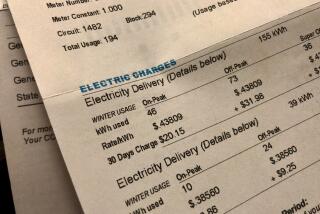Telephone Firms Devise Plan to Bar ‘976’ Calls
- Share via
California telephone customers soon will be able to cut off their own access (and that of their children) to dial-a-porn, chat lines and other unwanted “976” numbers, if the state Public Utilities Commission approves a suggested method, Pacific Bell said Wednesday.
The telephone company announced that if the PUC grants fast approval for its plan to block “976” calls at central offices rather than with devices on home phones, blocking will be available by the end of the year to about 90% (or 6.8 million) of its customers for a one-time $5 fee.
A spokesman for General Telephone Co., which has 2.3 million customers in the state, said General now routes “976” calls through Pacific Bell, but favors the central-office blocking plan and is prepared to do it as soon as the PUC acts.
Pacific Bell said it also is seeking PUC permission to refine the blocking system as early as next March by assigning a new “900” code and a specific prefix to each category of information service.
Customers Can Decide
“This will allow customers to decide what kind of programs they want to block,” said Pacific Bell spokesman Randall Strahan.
A telephone subscriber could, for example, chop off his access to sexually explicit services, but remain able to reach Dial-a-Prayer.
Or vice versa.
Pacific Bell said that, under the new prefixes, callers will hear warning messages notifying them of cost and content of the programs and allowing them to hang up without charge before the program begins.
Under the central-office plan, Pacific Bell said, it will not be possible to block calls to “976” numbers in other states.
The PUC last January ordered telephone companies to devise a means of allowing customers to block their access to 976-prefix numbers after thousands of customers complained of bills run up by calls to Santa, Dial-a-Joke, sexy talkers and chat lines. Such calls cost between 50 cents and $2 each, plus toll charges.
The PUC was complying with a bill passed last year by the Legislature that sought to protect parents from mountainous phone bills frequently run up by children--and to protect those same children from listening to steamy conversation.
Following its January order, the PUC delayed implementation until Jan. 1, 1988, to allow more hearings on the most feasible method of accomplishing those aims. Alternatives included risking a freedom-of-speech court battle by simply disconnecting sex-talk services or blocking out 976 on individual telephones.
The U.S. 9th Circuit Court of Appeals ruled last month in an Arizona case that private telephone companies have the right to disconnect sexually explicit phone services.
Strahan, however, said Pacific Bell had concluded that the outcome of that matter in the courts “at best, would be uncertain, and would not be in the best interests of the company or its customers.”
Robert Gnaizda of Public Advocates, the San Francisco public-interest law firm that sued both Pacific Bell and General Telephone over “976” services because of their impact on low-income families, said he was “very positive” over the Pacific Bell move.
He called it “enlightened self-interest,” because a recent study showed that more than 1.1 million families want to block access to “976” numbers.
Gnaizda said that, although relatively few people know of the refund policy on “976” calls, more than 100,000 families have received “substantial refunds” so far this year from both Pacific Bell and General. He said 420 families have received refunds of more than $1,000 each.
PUC guidelines call for a one-time refund of charges if the customer did not know that there were charges associated with the calls, or if children or others made them.
“The company is now biting the bullet,” Gnaizda said of the Pacific Bell move, “and my clients are appreciative.”
More to Read
Sign up for Essential California
The most important California stories and recommendations in your inbox every morning.
You may occasionally receive promotional content from the Los Angeles Times.













